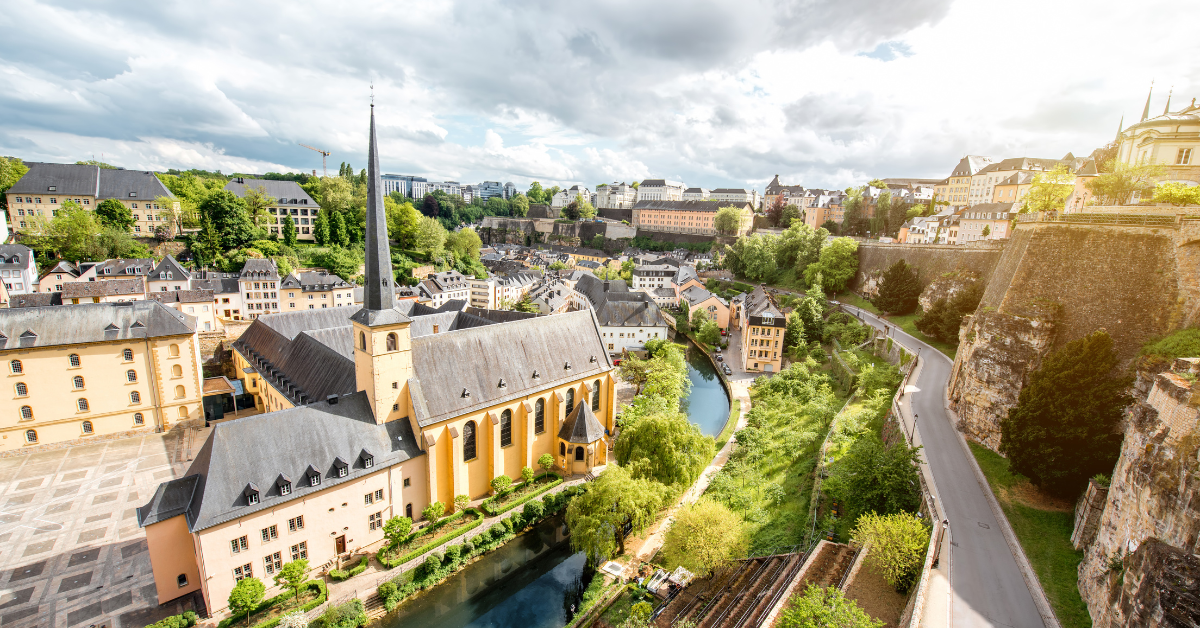Luxembourg, a small yet influential European nation, is represented in kanji as 盧森堡. This expression first appeared in Japan during the late Edo period. Today, Japanese impressions of Luxembourg are shaped by its wealth, cultural diversity, and balance between history and modernity, making it a country that leaves a lasting impression despite its small size.
The Origin of the Kanji Representation 盧森堡
Luxembourg’s kanji representation is 盧森堡. In the late Edo period, the diplomatic record “Bakumatsu Gaikōdan” referred to it using the old form 盧霖堡, which later evolved into its current form. Foreign place names written in kanji usually adopted characters that phonetically resembled the original sounds, often influenced by Chinese transliterations. Thus, 盧森堡 became established as an accessible way for Japanese people to understand and recognize the country.
The Image Japanese People Hold of Luxembourg
Although Luxembourg is not widely recognized among the Japanese public, those who know it often associate it with wealth, international finance, and harmony between nature and history.
| Image held by Japanese | Details |
|---|---|
| Economically wealthy | Ranks among the world’s highest in GDP per capita |
| Financial hub | Hosts international banks and investment institutions |
| Harmony of nature and culture | Features UNESCO World Heritage old towns and lush parks |
| Small but influential | Holds key EU institutions and has a strong international voice |
Historical Ties with Japan
The first recorded reference to Luxembourg in Japan dates back to late Edo diplomatic documents. As modernization progressed, formal diplomatic relations were established, leading to exchanges in economics, finance, and IT. In modern times, Japanese travelers often visit Luxembourg as part of a European tour, attracted by its beautiful towns, fortresses, and historic architecture.
Cultural Impressions
Luxembourg is a multilingual nation, with French, German, and Luxembourgish as its official languages. This diversity enriches its music, arts, and culinary culture. Japanese visitors often perceive Luxembourg as a country where different cultures coexist. Its wines, beers, and chocolates are especially appreciated, reinforcing its image as a destination for experiencing refined European tastes.
| Cultural Features | Details |
|---|---|
| Multilingual society | Three official languages used in education and government |
| Cuisine | Famous for wines, beers, and desserts |
| Arts | Hosts international music festivals and art exhibitions |
Tourism and the Japanese Perspective
The centerpiece of Luxembourg tourism is the UNESCO-listed old town and fortress remains. Cobblestone streets and massive stone walls preserve the medieval European atmosphere, leading Japanese travelers to describe it as “a small yet condensed country.” In addition, natural parks and valleys highlight the balance between urban and natural landscapes, offering Japanese tourists a refreshing experience.
Sports in Luxembourg
Luxembourg is strongly associated with cycling, having produced competitors in the Tour de France. Soccer also enjoys popularity, and the nation’s perseverance against stronger countries is admired.
| Sports | Features |
|---|---|
| Cycling | Produced Tour de France competitors |
| Soccer | Earns recognition for fighting spirit in international matches |
| Tennis | Rising young athletes participate in global tournaments |
Japanese impressions of Luxembourg in sports emphasize that it is a small country with great passion and vitality.
Education System and National Character
Luxembourg’s education system emphasizes multilingual instruction, requiring children to learn French, German, and Luxembourgish from an early age. This fosters internationally skilled citizens and has given Luxembourg the image in Japan of a small yet highly educated country. The country is also consistently ranked among the happiest nations, with stability and social balance supporting high life satisfaction.
| Education and Society | Features |
|---|---|
| Multilingual education | Children learn three languages from early schooling |
| High happiness index | Frequently ranked in the world’s top tier |
| International human capital | Produces talent for EU institutions and global companies |
Economic Model
Luxembourg’s economy is centered on finance, but it is also expanding into IT and space industries. Its flexible economic strategy demonstrates how a small nation can remain highly competitive. Japanese people often see Luxembourg as a forward-looking and steady nation that balances tradition and innovation.
Conclusion
Luxembourg is represented in kanji as 盧森堡, a name introduced in Japan during the late Edo period. Japanese impressions of the country highlight its wealth, cultural diversity, balance of nature and cities, international sports spirit, advanced education, and innovative economy. Luxembourg is thus viewed as a small country with significant global presence, and its appeal will likely continue to grow among the Japanese.






